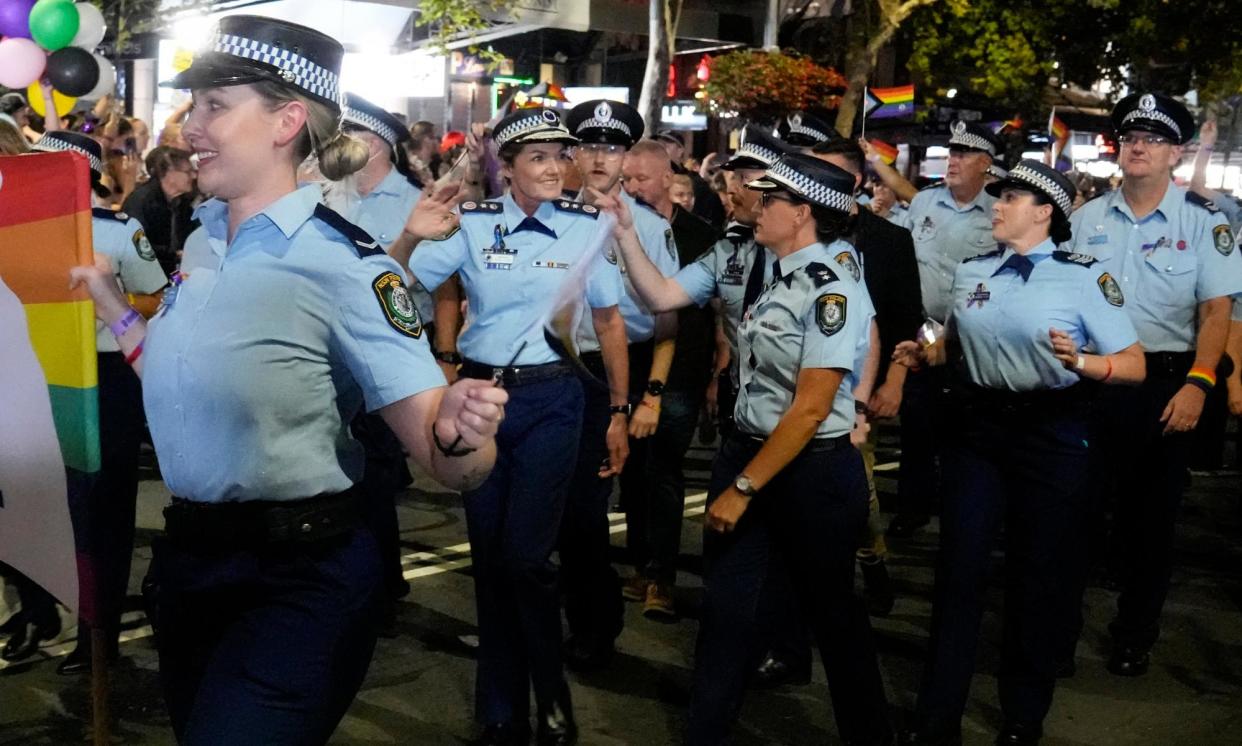NSW police to march in plainclothes at Sydney Mardi Gras after deal reached

NSW police will be allowed to march in plainclothes in Saturday’s Sydney Mardi Gras after an agreement with the event’s board was reached.
After police Sen Const Beau Lamarre was charged with the murder of Luke Davies and Jesse Baird, the Mardi Gras board this week asked the force not to march in the parade for the first time since 1998.
But in a statement on Wednesday, the NSW police commissioner, Karen Webb, said the police – who generally march in uniform – had agreed to march in plain clothes “in consideration of the sensitivities”.
“I am delighted that our LGBTQIA+ officers, as well as our other police who are allies and supporters, will be allowed to march this year as they have done for the past 20 years,” Webb said.
“The Sydney Gay and Lesbian Mardi Gras is an important event on the NSW police calendar and as commissioner, I am committed to continuing to strengthen the relationship between my organisation and the LGBTQIA+ community.
Related: ‘A lot of hurt and anger’: how the queer community feels let down by NSW police
“I thank the Mardi Gras Board for the cordial discussions over the past few days.”
The latest decision drew a fierce reaction from members of Pride in Protest who have long advocated for police to not march in the parade. In a statement posted to social media the group said the decision had betrayed the community and accused the Mardi Gras board of “cracking under police pressure”.
“Whether in uniform or not, police participation in the Mardi Gras parade is unacceptable,” they wrote.
“The revelations of continuing incompetence and disregard for community safety, as seen in the case of officer Lamarre, are only the latest demonstration that NSW police are not suitable, deserving or welcome to take part in the queer community’s premier annual celebrations.”
David Abello, a 78er – the term used for the group of protesters who started the first Mardi Gras in 1978 – said views on police participating in the parade were varied in the community.
“Personally, I don’t mind who is in the Mardi Gras, I think its a nice idea for police to march in plain clothes,” he said. “There are people who are very against this, but there are some who think that having police march is good for the community.”
James Breko, a former board member of Mardi Gras, said “neither side got exactly what they wanted”.
“I am happy for the enthusiastic members of the force who really wanted to march are getting to do so,” he said. “Whether it’s a good idea or the police should have just had a respectful break this year I think is something we will reflect on outside of this very tragic moment post Mardi Gras.”
The NSW police minister, Yasmin Catley, told Sydney radio station 2GB she was pleased officers would be able to march, adding: “The police have been marching for 20 years, and it really has gone a long way to help their relationship [with the LGBTQI+ community] and we didn’t want to break that.”
The independent MP for Sydney, Alex Greenwich, also welcomed the news that police will march in the parade.
“This is significant step in the LGBTQ community and police working together to improve community safety,” he wrote on X. “The focus must now shift to what supports are needed to improve the wellbeing of LGBTQ people across NSW.”
The Australian federal police released a statement on Tuesday announcing its officers would not march in the parade following the request from Mardi Gras for police not to join. It has yet to confirm whether it will reverse this decision.

 Yahoo News
Yahoo News 
